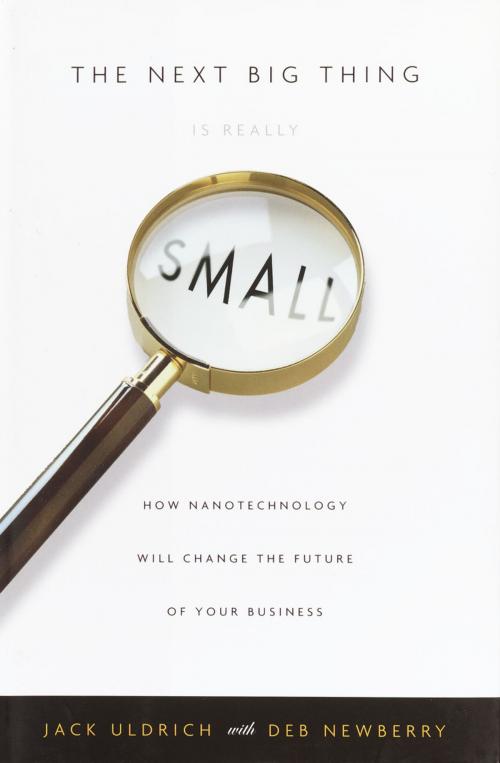The Next Big Thing Is Really Small
How Nanotechnology Will Change the Future of Your Business
Nonfiction, Science & Nature, Technology, Nanotechnology, Business & Finance, Management & Leadership, Planning & Forecasting, Industries & Professions, Industries| Author: | Jack Uldrich, Deb Newberry | ISBN: | 9781400049172 |
| Publisher: | The Crown Publishing Group | Publication: | March 11, 2003 |
| Imprint: | Crown Business | Language: | English |
| Author: | Jack Uldrich, Deb Newberry |
| ISBN: | 9781400049172 |
| Publisher: | The Crown Publishing Group |
| Publication: | March 11, 2003 |
| Imprint: | Crown Business |
| Language: | English |
nanotechnology \na-no--tek-'nä-l -je-\ n (1987): the science of manipulating material at the atomic level
Although nanotechnology deals with the very small—a nanometer is 1/80,000th the diameter of a human hair—it is going to be huge. From the food we eat, the clothes we wear, and the products we manufacture to the composition of our bodies, everything is made of atoms. And if we can manipulate the atom, then that changes the rules of the game for almost every product.
Coal and diamonds, for example, are both constructed from carbon atoms. It’s merely the arrangement of the atoms that differentiates an inexpensive fuel source from a pricey engagement jewel. While the science of nanotech cannot yet transform coal into diamonds, it is advancing rapidly and will begin to radically alter the business world during the next few years—and will continue to do so for the forseeable future.
The buzz surrounding nanotech is comparable to that at the dawn of the digital revolution, which changed the face of how business operates. Unlike the Internet, however, which applied new technology to many old processes and businesses, nanotech is about creating entirely new materials, products, and systems (and therefore markets), as well as making existing products faster, stronger, and better.
You may be tempted to wait until the buzz dies down before deciding how to integrate nanotech into your business, but don’t make the mistake of thinking of it as being light-years away. Even though it may sound far-off at times, within ten years nanotech will have huge effects on many industries, including manufacturing, health care, energy, agriculture, communications, transportation, and electronics. Within a decade, nanotechnology is expected to be the basis of $1 trillion worth of products in the United States alone and will create anywhere from 800,000 to 2 million new jobs.
Nanotechnology will require you to radically re-think what your core business is, who your competitors are, what skills your workforce needs, how to train your employees, and how to think strategically about the future. Jack Uldrich and Deb Newberry explain exactly how you should prepare for nanotech’s imminent arrival. They identify today’s nanotech innovators, chronicle and project the rapid rise of nanotech developments, and show how to think strategically about the field’s opportunities and investments.
The Next Big Thing Is Really Small provides a sneak peek at the technology that will transform the next ten years, giving investors and executives a road map for using small wonders to generate big profits.
nanotechnology \na-no--tek-'nä-l -je-\ n (1987): the science of manipulating material at the atomic level
Although nanotechnology deals with the very small—a nanometer is 1/80,000th the diameter of a human hair—it is going to be huge. From the food we eat, the clothes we wear, and the products we manufacture to the composition of our bodies, everything is made of atoms. And if we can manipulate the atom, then that changes the rules of the game for almost every product.
Coal and diamonds, for example, are both constructed from carbon atoms. It’s merely the arrangement of the atoms that differentiates an inexpensive fuel source from a pricey engagement jewel. While the science of nanotech cannot yet transform coal into diamonds, it is advancing rapidly and will begin to radically alter the business world during the next few years—and will continue to do so for the forseeable future.
The buzz surrounding nanotech is comparable to that at the dawn of the digital revolution, which changed the face of how business operates. Unlike the Internet, however, which applied new technology to many old processes and businesses, nanotech is about creating entirely new materials, products, and systems (and therefore markets), as well as making existing products faster, stronger, and better.
You may be tempted to wait until the buzz dies down before deciding how to integrate nanotech into your business, but don’t make the mistake of thinking of it as being light-years away. Even though it may sound far-off at times, within ten years nanotech will have huge effects on many industries, including manufacturing, health care, energy, agriculture, communications, transportation, and electronics. Within a decade, nanotechnology is expected to be the basis of $1 trillion worth of products in the United States alone and will create anywhere from 800,000 to 2 million new jobs.
Nanotechnology will require you to radically re-think what your core business is, who your competitors are, what skills your workforce needs, how to train your employees, and how to think strategically about the future. Jack Uldrich and Deb Newberry explain exactly how you should prepare for nanotech’s imminent arrival. They identify today’s nanotech innovators, chronicle and project the rapid rise of nanotech developments, and show how to think strategically about the field’s opportunities and investments.
The Next Big Thing Is Really Small provides a sneak peek at the technology that will transform the next ten years, giving investors and executives a road map for using small wonders to generate big profits.















